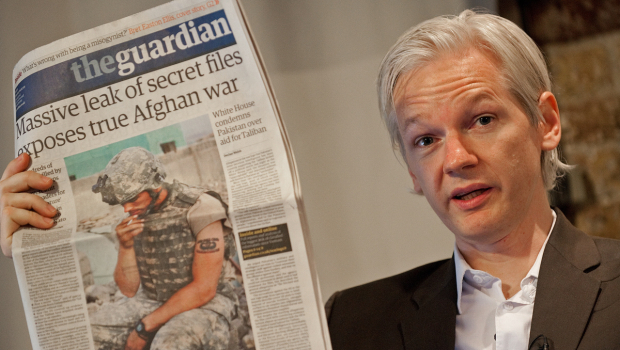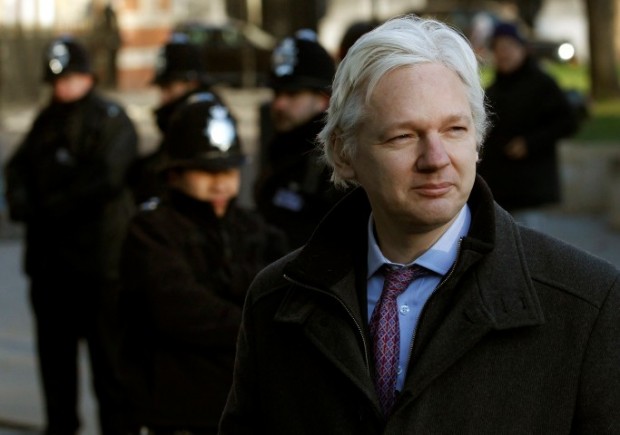|
Alex
Gibney’s latest
documentary ‘We Steal Secrets’ delves headfirst into the morally murky
and
hyperbole riddled world of people involved with Wikileaks.
The film is entertaining through and through,
with precise social commentary punctuating the ebb and flow of
deception and
revelation.
The
story unfolds in
a fresh and exciting way, even for those of us who’ve long saturated
our brains
in Wikileaks tidbits. Exceptional composition, accompanied by great
animations,
means it’s a triumph of editing. The score leads us from Midnight Oil
in a
quote on the WANK worm hack stemming from Melbourne in 1989, through to
Lady
Gaga, as Bradley Manning (allegedly) transfers the biggest information
leak to
date onto a CD labeled with the pop singer’s name. ‘We Steal Secrets’
invites
us into the moments of recent history being made.

Featuring
interviews
with the usual talking heads interspersed with archival footage of
Manning and
Assange, it divulges little new information to the informed viewer, but
brings
detail and the personal to the already well-worn tale. Clarity is
sought
through multiple perspectives, yet the craft of the film defies its
purpose: it
is too perfectly composed as a form of entertainment to attempt any
complex
philosophy surrounding the political and social implications of the
subject
matter.
The
director’s voice
is very present, with a focus on storytelling more than on genuinely
attempting
a search for truth, information or perspective. Gibney’s ethics could
be
questioned for making ‘We Steal Secrets’ at a time when many of the
protagonists
face dire repercussions, and while the film has a
strong
sense of moral outrage throughout, it is superficial and ultimately
shallow in
examining the legal, political and present historical contexts.

It
is, however,
intensely moving as a cinematic experience. The film hits all the highs
and
lows perfectly, from the excitement of Assange’s great rise, the little
guy who
likes to ‘crush bastards’, to the truly heartbreaking story of Bradley
Manning,
a misfit whose moral compass is struggling with great knowledge of
horrors of
war crimes hidden from the general public, and whose loneliness and
desperation
for companionship undid him.
The
film is
relatively evenhanded in neither damning nor glorifying Assange, but
following
him as a modern Shakespearean hero, where the real struggle is with the
moral
compass within. The shifting of the political to the individual is
presented as
an issue within the film, but one that it does little to mitigate
within
itself. As a litmus test of the film’s leanings, I admired the
cautiousness
regarding the sexual assault case brought to Assange in Sweden, in
which the theoretically
apolitical and apersonal intention of Wikileaks was perverted by a most
personal and muddy legal case that collided the individual with the
organisation.

On
a topic fraught
with hyperbole, the film attempts a balanced review of opinions, but is
more
concerned with the individual personalities involved than the greater
social
consequences (beyond dramatic statements). It points the blame at
Assange’s ego
for getting away from him, at Wikileaks for being underprepared to
release the
leaks without negative consequence, at the mainstream media,
particularly the
New York Times for abandoning its support of Wikileaks and effectively
throwing
Assange and free speech to the wolves, to the rabid fans of Wikileaks,
whose
cult-like adoration has twisted what should be apolitical method of
exposing
secrets, and at government and army denial of culpability for the
systemic
failure at preventing the leaks by use of Manning and Assange as
scapegoats.
This wild finger-pointing is exciting and touches on many prescient
issues, but
sadly falls short in enlightening us.
In
terms of filmmaking,
storytelling, editing, animation and entertainment, ‘We Steal Secrets’
is one
of the most enjoyable and moving films I’ve seen this year. With regard
to the
ethics and philosophy of documentary making, it’s a little behind the
times but
not so biased as to render it obsolete.

The
biggest drawcard
is the sense of immersion in the moment of history happening. Although
the film
already feels slightly dated since its completion and release, the
story has
evolved again with Edward Snowden and the NSA coming to the fore of
international public consciousness. The film’s title is delivered, not
by a
foolhardy Assange, but by Michael Hayden, former director of the CIA
and NSA,
lit in darkness, leaning toward camera with a chilling smirk: ‘I’m
going to be
very candid with you, right? We steal secrets.’ And so they do. I look
forward
to the documentary that details those crimes more than the
personalities of
those that expose them, but for the moment, Gibney’s film is a
fantastic and
moving story of those personalities.
|